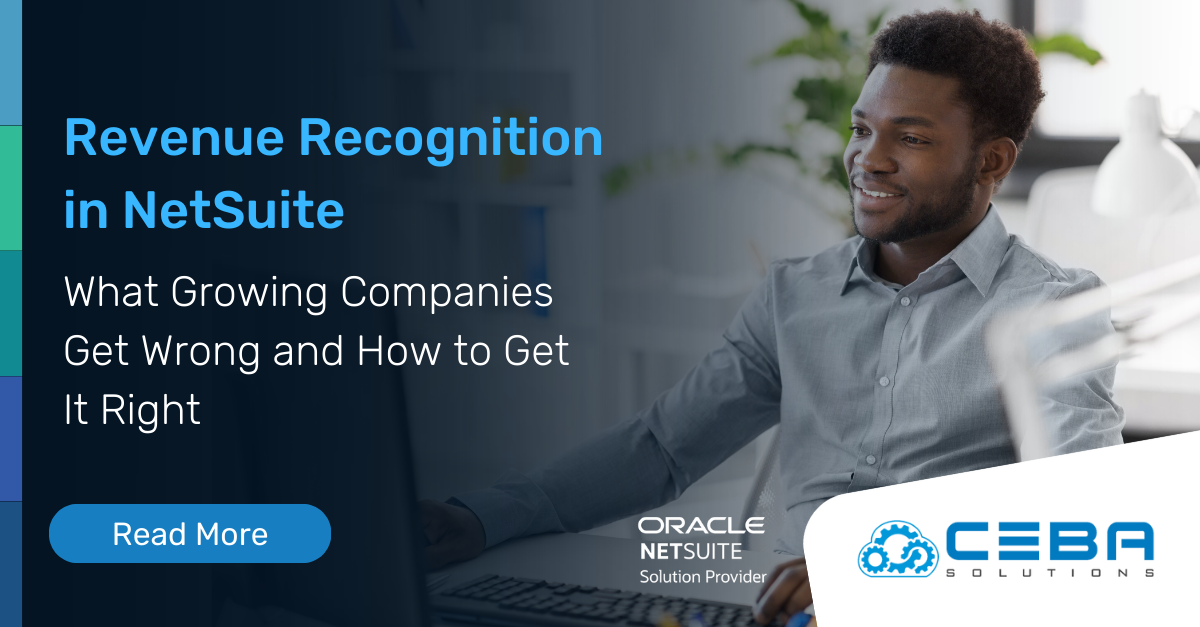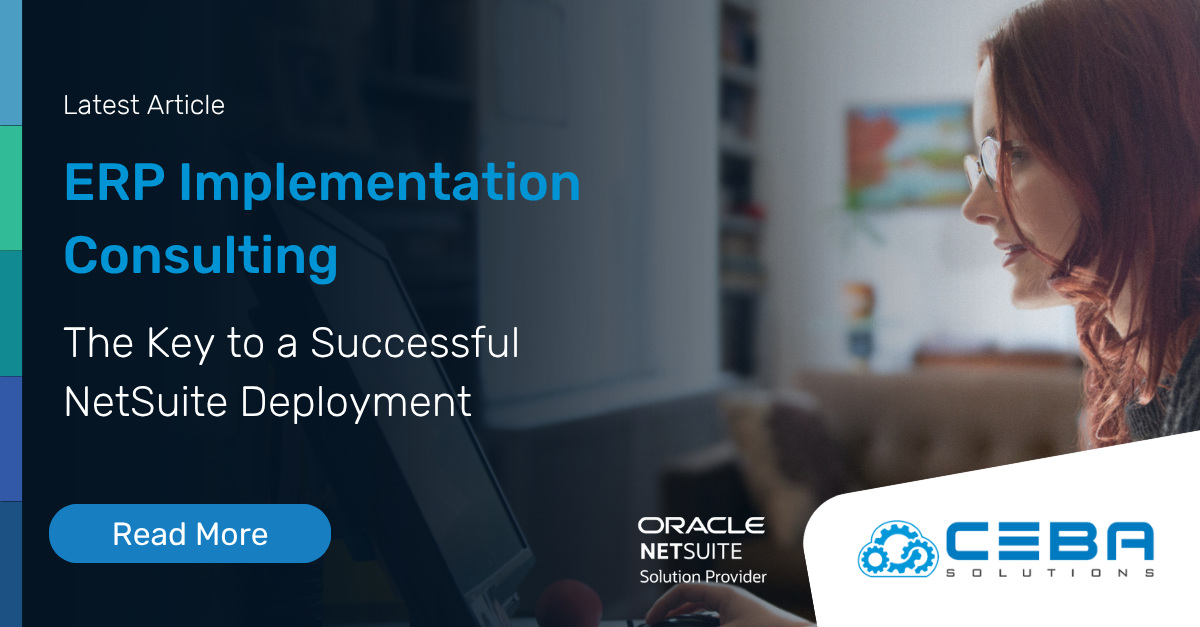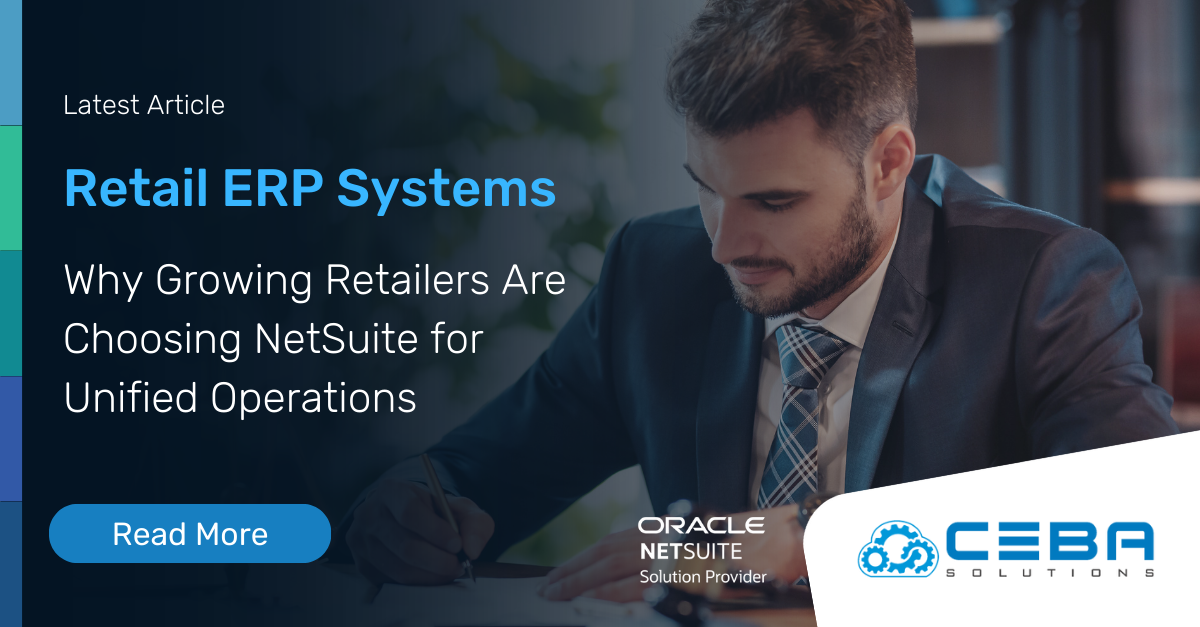
Does My Growing Company Need an ERP?
Does My Growing Company Need an ERP?
As your business grows, you'll likely need to implement new software to help manage different aspects of the company. An enterprise resource planning (ERP) system is one type of software that can benefit businesses of all sizes. ERP systems are designed to help businesses manage their core operations, including accounting, human resources, and manufacturing.
If you're wondering whether your growing company needs an ERP system, there are a few factors to consider. First, consider the current state of your business and whether you're using manual processes or outdated software to manage your operations. If you're finding it difficult to keep track of essential data or constantly dealing with errors, an ERP system can help you streamline your processes and improve efficiency.
Another factor to consider is whether you have plans to expand your business in the future. If you're considering opening new locations or adding new products and services, an ERP system can help you manage this growth effectively. Additionally, if you're anticipating a merger or acquisition, an ERP system can help you integrate your operations with your new partner's.
Finally, it's essential to consider the costs of implementing an ERP system. While an upfront investment is required, an ERP system can save your business money in the long run by improving efficiency and reducing errors. Additionally, an ERP system can help you make better decisions by providing real-time data and insights into your operations.

Download the Ultimate Guide to Oracle NetSuite
Learn why NetSuite is the #1 Cloud ERP for Small and Mid Size Businesses Focused on Unlocking Growth. Download the Guide
Helping Start-Ups Understand the Value of Implementing ERP Early
Organizations use software to manage day-to-day business activities like accounting, procurement, project management, risk management, compliance, and supply chain Enterprise resource planning (ERP) covers a wide swath of capabilities that growing companies need to manage their operations efficiently.
And while a startup’s first instinct may be to cobble together some basic accounting software like QuickBooks with a stack of Excel spreadsheets—and then use that to manage their operations—the reality is that putting an ERP like NetSuite in place early can help companies save a lot of time and cost associated with disparate systems.
NetSuite also gives companies a highly scalable, expandable solution that grows along with them. For many, it’s the only ERP they ever need, even as they add more customers, employees, locations, and even multinational subsidiaries to their growing enterprise.
Here are some of the telltale signs that your growing small to midsize business would benefit from a unified, cloud-based enterprise resource planning solution.
Software that organizations use to manage day-to-day business activities like accounting, procurement, project management, risk management, compliance and supply chain, enterprise resource planning (ERP) covers a wide swath of capabilities that growing companies need to be able to manage their operations efficiently.
And while a startup’s first instinct may be to cobble together some basic accounting software like QuickBooks with a stack of Excel spreadsheets—and then use that to manage their operations—the reality is that putting an ERP like NetSuite in place early can help companies save a lot of time and cost associated with disparate systems.
NetSuite also gives companies a highly scalable, expandable solution that grows along with them. For many, it’s the only ERP that they ever need, and even as they add more customers, employees, locations and even multinational subsidiaries to their growing enterprise.
Don’t Ignore the Obvious
According to Oracle, it’s become impossible to ignore the impact of ERP in today’s business world. As enterprise data and processes are corralled into ERP systems, businesses can align separate departments and improve workflows, resulting in significant bottom-line savings.

ERP automates and supports a range of administrative and operational business processes across multiple industries, including line of business, customer-facing, administrative and the asset management aspects of an enterprise, Gartner explains. Once in place, these platforms give companies:
· A catalyst for business innovation
· A platform for business process efficiency
· A vehicle for process standardization
· IT cost savings
“Most enterprises focus on the last two areas, because they are the easiest to quantify,” Gartner points out, “however, the first two areas often have the most significant impact on the enterprise.”

Measuring the Benefits
For growing companies, ERP offers benefits like:
- Improved business insight from real-time information generated by reports.
- Lower operational costs through streamlined business processes and best practices.
- Enhanced collaboration from users sharing data in contracts, requisitions, and purchase orders.
- Improved efficiency through a common user experience across many business functions and well-defined business processes.
- Consistent infrastructure from the back office to the front office, with all business activities having the same look and feel.
- Higher user-adoption rates from a common user experience and design.
- Reduced risk through improved data integrity and financial controls.
- Lower management and operational costs through uniform and integrated systems.
“ERP systems unify an organization’s financial reporting by integrating financial information in a single system. They also integrate order management, making order taking, manufacturing, inventory, accounting, and distribution a much simpler and less error-prone process,” IT consultant Bart Perkins writes in CIO. “Most ERPs [NetSuite included] also include customer relationship management (CRM) tools to track customer interactions, thereby providing deeper insights about customer behavior and needs.”
These platforms also standardize manufacturing and supporting processes, unifying procurement across an organization’s disparate business units. “An ERP system can also provide a standardized HR platform for time reporting, expense tracking, training, skills matching, and the like,” Perkins writes, “and greatly enhance an organization's ability to file the necessary reporting for government regulations across finance, HR and the supply chain.”
Minimized Risk, Increased Profits
Along with providing complete visibility into business operations, ERPs also help small to midsize companies improve their operations; expand their businesses without adding IT or staffing expenses; gain competitive advantage; increase productivity; and reduce overall costs.
These platforms also serve as excellent business intelligence tools. “With the plethora of information available in a central database, you can create reports and dashboards that include everything from income and expense statements to custom KPIs that offer useful business insights,” Payal Tikait writes in The Best ERP Software Systems for Small Business. “ERP for small businesses helps make data-driven decisions to minimize risks and increase profits.”
But Implementing ERP is complicated, right?
You may have heard that ERP solutions are intimidating, but don't worry; the good news is that setting up an ERP can actually be quite simple when you select the right system and implementation partner. CEBA Solutions is a solution partner of NetSuite ERP, and we help small businesses scale their businesses with NetSuite.
NetSuite has created specific editions of its software designed to get smaller businesses up and running in as little as 100 days. And with CEBA Solutions' team of NetSuite experts, we can help you get the most out of your investment and ensure a successful implementation.
If you have questions about whether ERP suits your business, don't hesitate to contact us. We would be happy to chat with you about your specific needs and goals.
About CEBA Solutions
CEBA Solutions is a NetSuite Solution Provider that helps small businesses scale their businesses with NetSuite. We have a team of NetSuite experts who can help you get the most out of your investment and ensure a successful implementation.
With a growing team of project management, functional and technical consultants, and customer success managers, CEBA Solutions is committed to helping our clients overcome any NetSuite challenge.
Whether you are looking for a new NetSuite implementation, integration, customization, or just some training on how to use the platform more effectively, we can help. Contact us today to learn more about how we can help you grow your business with NetSuite.









